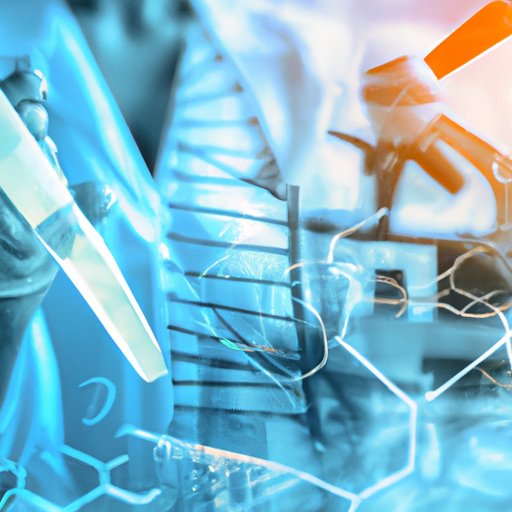Introduction
Biomedical sciences is a field of science that focuses on understanding the structure and function of living organisms, including humans. It studies the causes, diagnosis, prevention and treatment of diseases and other health-related conditions. It is an interdisciplinary field that combines elements of biology, medicine, chemistry, physics, mathematics and engineering to develop new technologies and treatments for diseases.
Biomedical sciences has become increasingly important in healthcare due to advances in technology and research. It is used to diagnose and treat a wide range of illnesses and diseases, as well as to monitor and improve patient outcomes. By understanding how the body works and responding to changes in its environment, biomedical sciences can help to prevent and treat illnesses and diseases more effectively.

Exploring the Role of Biomedical Sciences in Healthcare
Biomedical scientists are the professionals who work in the field of biomedical sciences. They are responsible for researching, developing and implementing new therapies, treatments, and technologies for healthcare. They use their knowledge of biology, chemistry, and other sciences to investigate diseases and develop new ways to diagnose and treat them. In addition, they may conduct laboratory tests and analyze results to provide information about patients’ health.
Biomedical scientists play an important role in healthcare by helping to make sure that patients receive the best possible care. Their research and development efforts lead to improved treatments and technologies, which can greatly improve patient outcomes. For example, the development of new drugs and medical devices has had a significant impact on the treatment of cancer and other diseases.

The Benefits of Pursuing a Career in Biomedical Sciences
A career in biomedical sciences offers many professional and personal benefits. Professionally, there are opportunities for growth and advancement as biomedical scientists gain experience and knowledge in their field. Additionally, job security and satisfaction are high, as biomedical scientists are often in demand and have the opportunity to make a positive difference in people’s lives.
In terms of personal benefits, biomedical scientists have the chance to work with state-of-the-art equipment and collaborate with colleagues from around the world. They have the opportunity to explore new ideas and develop new treatments and technologies that can improve the lives of patients. In addition, biomedical scientists have the chance to work in a variety of settings, from hospitals and laboratories to universities and research centers.
Introducing the Major Branches of Biomedical Sciences
Biomedical sciences is a broad field that encompasses several different subfields. The major branches of biomedical sciences include:
- Clinical Science: Clinical science focuses on the diagnosis and treatment of diseases and other health-related conditions. It includes fields such as clinical pathology, hematology, and immunology.
- Molecular Medicine: Molecular medicine studies the molecular mechanisms behind diseases and their treatments. It includes fields such as genetics and genomics, biochemistry, and cell and molecular biology.
- Pathology: Pathology focuses on the study of disease and the effects that it has on the body. It includes fields such as histopathology, cytology, and autopsy.
- Pharmacology: Pharmacology studies how drugs interact with the body and how they affect health. It includes fields such as toxicology, drug design, and pharmacokinetics.
- Physiology: Physiology focuses on the functioning of the body and how it responds to different stimuli. It includes fields such as endocrinology, exercise physiology, and neurophysiology.
Biomedical Scientists at Work: A Day in the Life
A typical day in the life of a biomedical scientist may involve a variety of tasks. Depending on the type of role, duties may include conducting laboratory tests, analyzing data, writing reports, and presenting findings. Biomedical scientists may also be involved in research projects, teaching or lecturing, or providing clinical advice to doctors and other healthcare providers.
Biomedical scientists typically work in laboratories or offices, but they may also travel to visit patients or attend conferences. Working hours vary depending on the position, but most biomedical scientists work full-time. The working environment is usually clean and organized, and safety protocols are strictly followed.

A Look Ahead: Future Trends in Biomedical Sciences
The field of biomedical sciences is rapidly evolving, and there are a number of exciting trends on the horizon. Advances in diagnostics and treatments are leading to improved patient outcomes, while technological developments are allowing biomedical scientists to gather and analyze data more quickly and accurately than ever before. In addition, the demand for biomedical scientists is increasing as healthcare systems around the world become more complex and specialized.
These trends will continue to shape the field of biomedical sciences in the years to come. Biomedical scientists will need to stay abreast of the latest developments in order to remain competitive. As the field evolves, biomedical scientists will have the opportunity to work on cutting-edge research projects and develop new treatments and technologies that can improve the lives of patients.
Conclusion
Biomedical sciences is an interdisciplinary field that combines elements of biology, chemistry, and other sciences to develop new technologies and treatments for healthcare. Biomedical scientists play an important role in healthcare by researching, developing, and implementing new therapies and treatments. There are many professional and personal benefits to pursuing a career in biomedical sciences, including job security and satisfaction, opportunities for growth and advancement, and the chance to make a positive difference in people’s lives.
The field of biomedical sciences is constantly changing and evolving, and there are a number of exciting trends on the horizon. As these trends continue to shape the field, biomedical scientists will have the opportunity to work on cutting-edge research projects and develop new treatments and technologies that can improve the lives of patients.
(Note: Is this article not meeting your expectations? Do you have knowledge or insights to share? Unlock new opportunities and expand your reach by joining our authors team. Click Registration to join us and share your expertise with our readers.)
